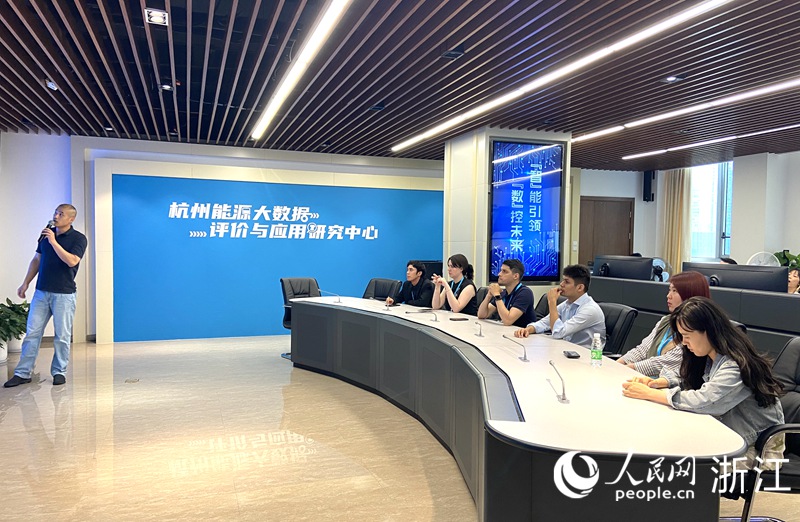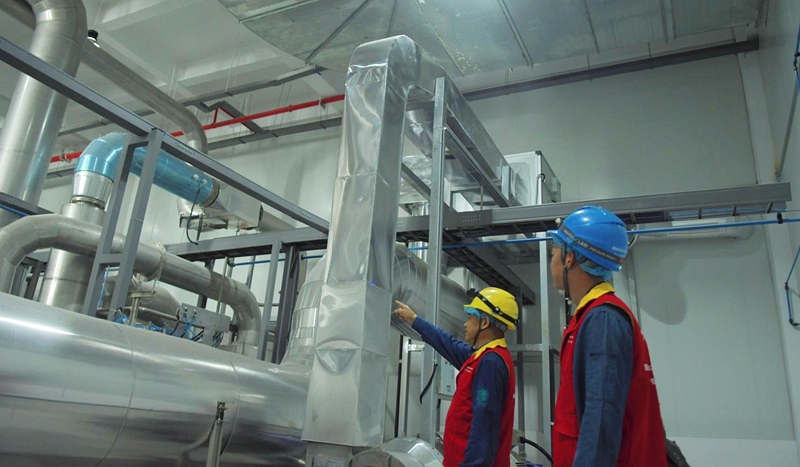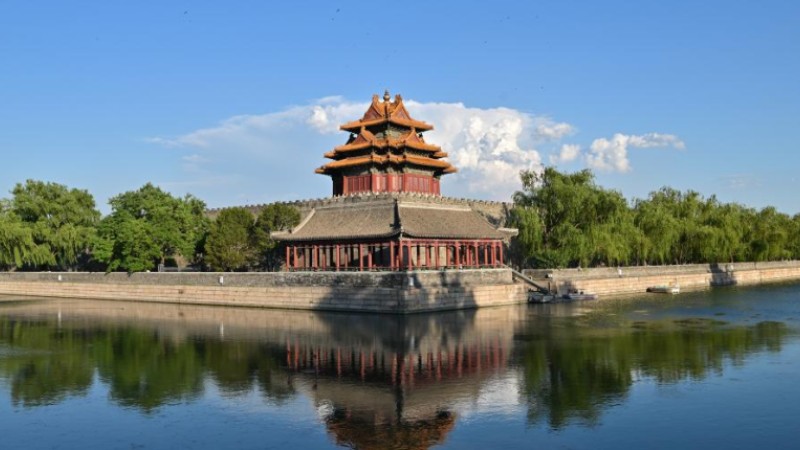Intelligent platform advances Hangzhou’s carbon peaking efforts
Hangzhou in east China’s Zhejiang Province recently released a Three-Year Carbon Peaking Action Plan, which focuses on the construction of the dual-carbon digital intelligent platform, the establishment of the “dual-carbon brain” in residential life, the creation of numerous carbon justice scenarios, and the inclusion of the dual-carbon concept in the urban governance system.
In June, the “Hello, Carbon Neutrality” research group, an initiative of People’s Daily Online, visited the State Grid Hangzhou Power Supply Co., Ltd. At the Hangzhou Energy Big Data Evaluation and Application Research Center, Tan Xiao, an official with the Hangzhou Development and Reform Commission introduced the “Hangzhou dual carbon digital intelligent platform”, which is used to monitor key energy-consuming enterprises in this city.

Members of the“Hello, Carbon Neutrality" research group listen to the introduction to "Hangzhou dual carbon digital intelligent platform" in the Hangzhou Energy Big Data Evaluation and Application Research Center. (People’s Daily Online/Fang Pengyimeng)
In 2021, entrusted by Hangzhou Development and Reform Commission, State Grid Hangzhou Power Supply Co., Ltd. integrated data on four types of energy - electricity, gas, oil and coal - in Hangzhou and information independently reported by key monitoring enterprises, focusing on the four core indicators including total energy consumption, total carbon emission, energy consumption intensity and carbon emission intensity, and developed the “Hangzhou dual carbon digital intelligent platform”. The platform, which began its trial operation in September 2021, provides digital and intelligent supervision over more than 2,390 industrial enterprises with annual energy consumption of 1,000 tons of standard coal and public buildings with annual power consumption of more than 1 million KWH in Hangzhou.

The “Hangzhou dual carbon digital intelligent platform” interface. (Photo courtesy of State Grid Hangzhou Power Supply Co., Ltd.)
“Using the dual carbon digital and intelligent analyzing system, information management system of energy use and information service system of energy conservation, energy consumption and carbon emission can be accurately managed and controlled,” said Tan, adding that a major feature of the platform is its focus on detail. All the data of the platform is based on the macro data generated by the summary of the energy usage of more than 2,390 key energy-using enterprises in Hangzhou, which covers nearly 90 percent of the energy usage of industrial enterprises in the city. “In terms of industrial carbon emissions, grasping this corporate data provides us a starting point for carbon emission management and daily work,” Tan said.

A platform data analysis meeting.? (Photo courtesy of State Grid Hangzhou Power Supply Co., Ltd.)
In June 2022, Hangzhou Energy Big Data Evaluation and Application Research Center found that the Hangzhou Nbond Nonwovens Co., Ltd. had high energy consumption and had great room for improvement in energy efficiency.
The center and State Grid Hangzhou Linping Power Supply Co., Ltd. then conducted an investigation of the site and found that due to the company’s production features, a great deal of waste heat and waste gas was generated during processing. To reduce high energy consumption and high emission, the company commissioned Linping Power Supply Co., Ltd. to construct a chemical fiber waste heat recovery system. After a field investigation, program design, effect evaluation, equipment procurement, engineering construction and other work, in June 2023, the waste heat recovery system was officially put into operation.

On June 12, 2023, the waste heat recovery system of Hangzhou Nbond Nonwovens Co., Ltd. was officially put into operation. (Photo courtesy of State Grid Hangzhou Power Supply Co., Ltd.)
“Improving energy efficiency and reducing carbon dioxide emissions is the key to achieving the ‘dual-carbon’ goal. The current recycling of waste heat can efficiently use fossil fuels, thereby reducing carbon emissions. In addition, for companies, ‘turning waste into treasure’ also reduces production costs, achieving a win-win cooperation between society and companies,” said Lai Shangdong, deputy director of the service (allocation) sub-center of Linping Power Supply Co., Ltd.
Tan said that the government departments developed the “Energy Manager” app to enhance the regulation of all key energy using enterprises in Hangzhou and introduce new service measures, so as to provide regulation and services at the same time.

The enterprise application interface of the “Energy Manager” app. (Photo courtesy of State Grid Hangzhou Power Supply Co., Ltd.)
“‘Energy Manager’ has an ‘energy saving service provider’ module, which presently gathers Hangzhou’s largest 30 or 40 energy saving service providers.” Companies can select products in this module for energy saving needs in equipment, production lines, energy management, digitalization, and so on,” Tan explained, “There are also energy-saving modules for used equipment. Many companies have upgraded and replaced some equipment, which were previously sold as scrap iron and are now being purchased through the platform."

Used equipment discarded by enterprises can be traded in the “energy service provider” module in “Energy Manager” app. (Photo courtesy of State Grid Hangzhou Power Supply Co., Ltd.)
Every major energy-using enterprise in Hangzhou has a carbon index, which is not used solely for evaluation. Through the carbon index, companies can also enjoy effective preferential interest rates.
“We have provided the corporate carbon index to more than a dozen banks. Dozens of financial products have recognized the carbon index. After logging in, enterprises can directly use its carbon index to enjoy preferential green loan rates in the app,” Tan said.
For energy saving service providers, “Energy Manager” is a large regional market of thousands of energy consuming enterprises, through which the enterprises’ outstanding products and technology can be showcased. For energy-using enterprises, the service platform built by the government connects demand and response, where they can learn about advanced products and technology at any time, thus benefiting from energy conservation and emission reduction work.
“With the further advancement of the ‘dual carbon’ work, the ‘Hangzhou dual carbon digital intelligent platform’ will also be further improved and play a greater role,” Tan said.
Photos
Related Stories
- Tech helps water purification plant in Suzhou lower emissions
- Baosteel strives towards achieving dual carbon goals
- South Korean reporter explores 'dual carbon' progress in E China
- Inner Mongolia's 'energy city' embraces wind and solar power development
- American reporter explores low-carbon facilities in Hangzhou, E China
Copyright © 2023 People's Daily Online. All Rights Reserved.









